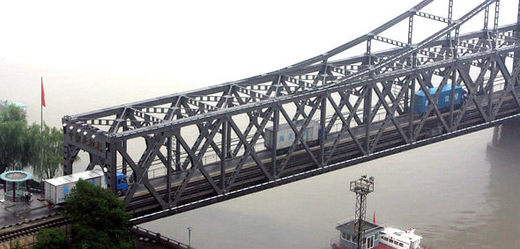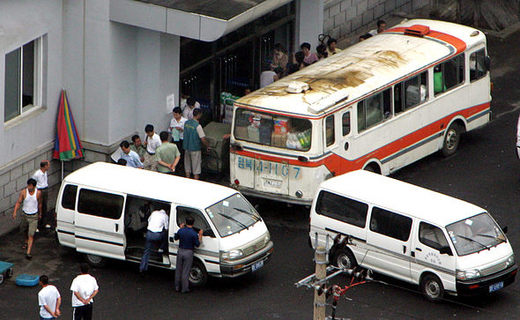 |
|
A row of trucks, headed to North Korea from China, cross a border bridge on the Aprok River on July 31.
|
International trade, even with China, expected to dwindle
Lee Sang Su, correspondent for the Hankyoreh DANDONG, China - If you take the pleasure boat that leaves from the Aprok River, or the Yalu River in Dandong, Liaoning Province, northeast China, the boat will ply waters less then 10 meters from Shinuiju, a town on the border between China and North Korea. Though the North received heavy rainfall in the past weeks, on the morning of July 30, from the Yalu riverboat, North Korean children were seen catching crabs in the muddy water, smiling, while some adults caught fish nearby. Corn seemed to be growing well on the North Korean plains skirting the Aprok River. North Korean soldiers were doing repair works on a river embankment, stopping briefly only to say, “Don’t take photos” and resuming their work. The village beside the river looked peaceful, contrary to the known food shortage the North is going through, caused by international isolation following its missile tests on July 5 local time, as well as the damage wrought by the flooding. Dandong is the biggest of North Korea-China border cities, enjoying a large volume of trade between the two countries. On weekdays, eight-ton trucks - loaded up with all kinds of commodities, as well as Chinese-made daily necessities - cross a bridge on the Aprok River in file and return with North Korean goods, including mineral products. In this border city, people shuffle back and forth across the border, as well: international train service runs between Beijing and Pyongyang once every two days. Dandong is a key point through which the North imports its most essential goods: food and energy. A notice on farmland in the area reads, “high-temperature, high-pressure and explosive oil pipeline is laid under the ground. Deep digging is prohibited within 5 meters from both sides of the pipeline.” The pipeline extends from Daqing, China, into North Korea. After Pyongyang conducted its most recent missile tests, the communist nation made an appeal at inter-Korea ministerial talks about its food shortage. Then in mid-July the North was severely hit by floods. Trade and city officials whom I met in Dandong, a city with a large trade volume with North Korea, predicted that tension created by the North’s missile and nuclear programs will slowly affect the North Korean economy and the pace of its open-door policy, referring to the fact that the North is already more isolated economically as a result. In the short term, the food shortage is the biggest problem. A Chinese businessman who visits North Korea for frequent trade said, “The food shortage in North Korea is most serious from April until June every year. Then in July and August, the shortage is a little bit eased thanks to potatoes and corn. This year, however, because of flooding, the production volume of key agricultural products, including rice, potatoes, and corn, is expected to significantly decrease,” he added.
 |
|
Dozens of Chinese travelers load their luggage onto buses parked by a customs building in the border city of Dandong, China on July 31.
|






